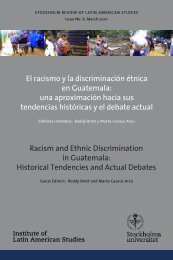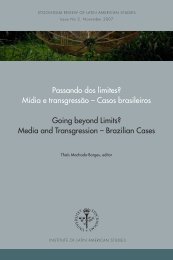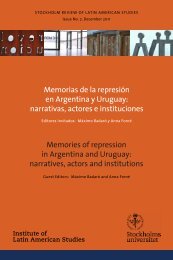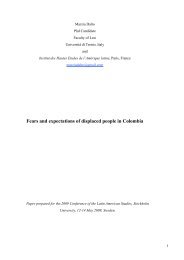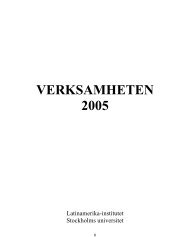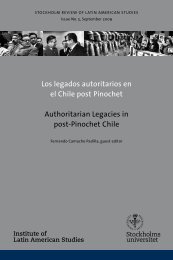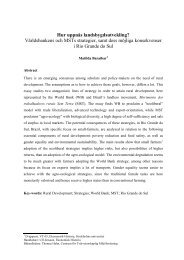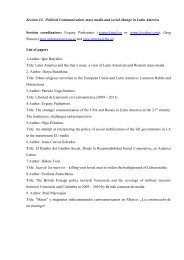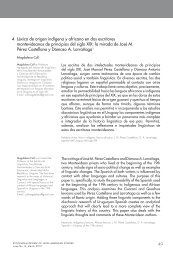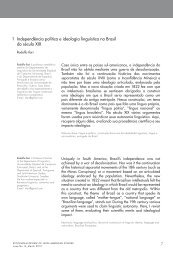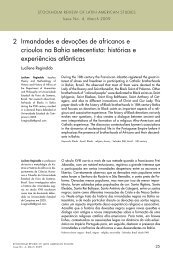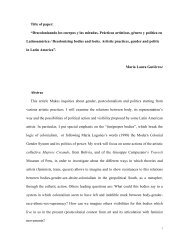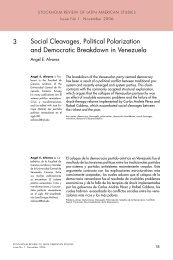Venezuelan Politics and Society in Times of Chavismo PolÃtica y ...
Venezuelan Politics and Society in Times of Chavismo PolÃtica y ...
Venezuelan Politics and Society in Times of Chavismo PolÃtica y ...
You also want an ePaper? Increase the reach of your titles
YUMPU automatically turns print PDFs into web optimized ePapers that Google loves.
Has <strong>Venezuelan</strong> Decentralization Sur vived <strong>Chavismo</strong><br />
Rickard O. Lal<strong>and</strong>er<br />
concentrated <strong>in</strong> the act<strong>in</strong>gs <strong>and</strong> pronounciations<br />
<strong>of</strong> President Chávez, to such extent that from this<br />
perspective Chávez could be classified as the actual<br />
leader – or anti-leader- <strong>of</strong> the present <strong>Venezuelan</strong><br />
opposition. Nevertheless, round<strong>in</strong>g <strong>of</strong>f the analysis,<br />
the possibly strongest presidential c<strong>and</strong>idate <strong>of</strong> the<br />
present opposition before the elections <strong>in</strong> December<br />
2006 is Manuel Rosales, 13 most <strong>of</strong> all recognized<br />
for his merits as mayor <strong>of</strong> oil metropolis Maracaibo<br />
<strong>and</strong> thereafter governor <strong>of</strong> the important Zulia<br />
state, once aga<strong>in</strong> emphasiz<strong>in</strong>g the importance <strong>of</strong> the<br />
<strong>Venezuelan</strong> decentralization.<br />
F<strong>in</strong>al remarks<br />
Some <strong>of</strong> the most skeptical critics <strong>of</strong> both <strong>Chavismo</strong><br />
<strong>and</strong> decentralization would say that the former has<br />
def<strong>in</strong>itively ext<strong>in</strong>guished the latter. I do not agree;<br />
as demonstrated, the decentralized framework is<br />
still function<strong>in</strong>g <strong>and</strong> cont<strong>in</strong>ues to have impacts on<br />
the party system as well as the way <strong>of</strong> do<strong>in</strong>g politics<br />
at all political territorial levels. Despite his be<strong>in</strong>g<br />
classified as a centralist political leader, Chávez<br />
<strong>and</strong> <strong>Chavismo</strong> have recognized decentralization as<br />
a system, but <strong>in</strong> need <strong>of</strong> modifications, <strong>in</strong>clud<strong>in</strong>g a<br />
suggested withdrawal <strong>of</strong> power from the governors.<br />
Furthermore, it has been emphasized that <strong>Chavismo</strong><br />
is propos<strong>in</strong>g a deconcentrated model <strong>of</strong> decentralization,<br />
that is, with a stronger control from the central<br />
political level. Likewise, as has been mentioned,<br />
certa<strong>in</strong> aspects <strong>of</strong> the populism <strong>and</strong> power concentration<br />
<strong>of</strong> <strong>Chavismo</strong> constitutes a source <strong>of</strong> conflict<br />
(<strong>and</strong> a threat) for the democratization pr<strong>in</strong>ciples<br />
<strong>of</strong> decentralization. A cont<strong>in</strong>uation <strong>of</strong> the populist<br />
model <strong>of</strong> political leadership could implicate a prolonged<br />
weaken<strong>in</strong>g <strong>of</strong> civil society <strong>and</strong> <strong>of</strong> the democratic<br />
space for mobilization. Notwithst<strong>and</strong><strong>in</strong>g, I<br />
do not aim at stat<strong>in</strong>g that all populisms are always<br />
bad. In times <strong>of</strong> credibility crisis <strong>and</strong> political disillusion<br />
on behalf <strong>of</strong> the citizens -with the <strong>in</strong>built<br />
repercussions <strong>in</strong> form <strong>of</strong> obstacles for governability-<br />
a populist leader (or movement) could emerge<br />
<strong>and</strong> (re-) motivate citizens´ belief <strong>in</strong> democracy <strong>and</strong><br />
politics. That is, if the populism wakes up the conscience<br />
<strong>and</strong> will for political participation among<br />
the citizens with<strong>in</strong> a democratic scheme, then favourable<br />
factors can <strong>in</strong>dicate toward the legitimacy<br />
<strong>and</strong> democratic function<strong>in</strong>g <strong>of</strong> populism dur<strong>in</strong>g a<br />
period <strong>of</strong> time. However, with<strong>in</strong> a longer perspective,<br />
populism <strong>and</strong> its anti-parliamentary traits constitute<br />
a clear threat to democracy <strong>and</strong> decentralization.<br />
Notwithst<strong>and</strong><strong>in</strong>g, the symbolic value <strong>of</strong> the new<br />
leaderships <strong>and</strong> the consequences derived from decentralization<br />
for the legitimacy <strong>of</strong> the political system<br />
are <strong>of</strong>ten mentioned as one <strong>of</strong> the most evident<br />
positive results <strong>of</strong> decentralization. Citizens <strong>and</strong><br />
organizations have ga<strong>in</strong>ed better channels for political<br />
participation <strong>in</strong> the public sector. Generally<br />
speak<strong>in</strong>g, what might be promis<strong>in</strong>g for the future is<br />
that practically all the major political actors present<br />
themselves as defenders <strong>of</strong> decentralization as a<br />
political <strong>and</strong> governmental model. Variations do<br />
however exist among parties <strong>and</strong> politicians about<br />
how the divisions <strong>of</strong> power <strong>and</strong> economic resources<br />
should be distributed. Decentralization has thus<br />
contributed to democratic improvements, but also<br />
to complications <strong>and</strong> confusions, with a duplication<br />
<strong>of</strong> bureaucracy <strong>and</strong> possibilities <strong>of</strong> clientelistic<br />
behaviour, vices that still burden <strong>Venezuelan</strong> society<br />
<strong>and</strong> politics.<br />
13 Rosales was previously an AD militant, but formed his new<br />
regional party Un Nuevo Tiempo (A New Time). By August<br />
2006 Rosales was <strong>of</strong>ficially backed-up by several <strong>of</strong> the other<br />
presidential c<strong>and</strong>idates <strong>of</strong> the opposition, among others Julio<br />
Borges (Primero Justicia) <strong>and</strong> former MAS leader Teodoro<br />
Petk<strong>of</strong>f. Likewise many AD leaders <strong>and</strong> militants support<br />
the c<strong>and</strong>idature <strong>of</strong> Rosales.<br />
Stockholm REVIEW OF Lat<strong>in</strong> American Studies<br />
Issue No 1. November 2006<br />
40



